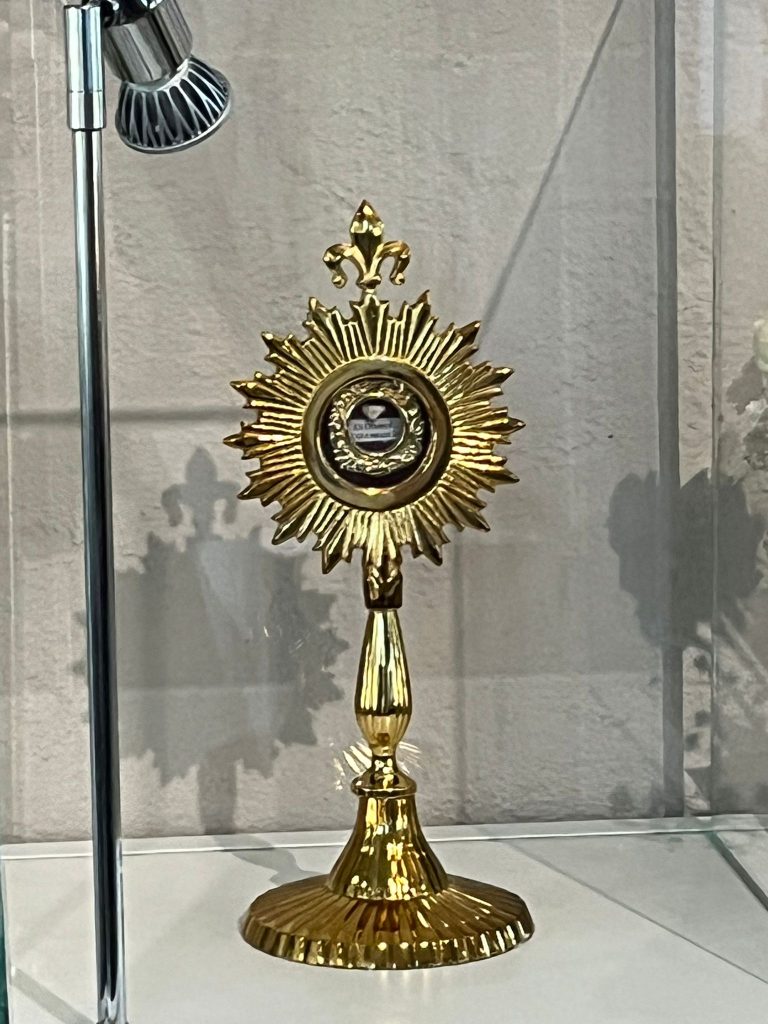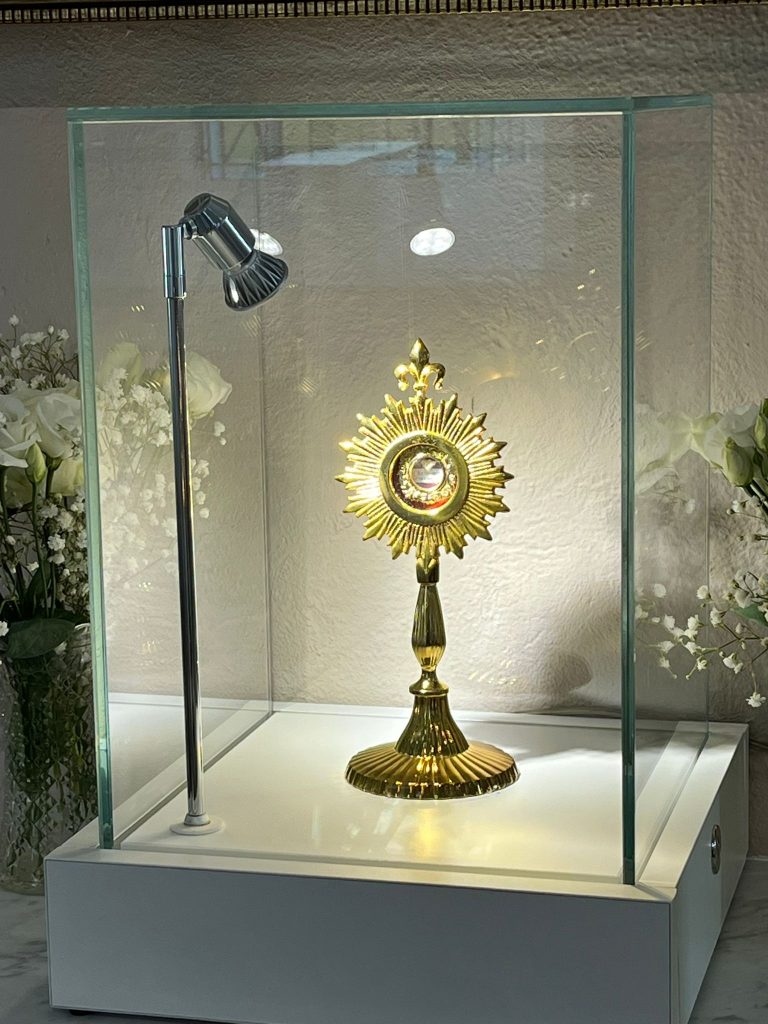Feast of Christ the King – Year C: 23.11.25
Church of the Exaltation of the Cross @ 10am
Introduction:
The installation of the sacred relic of St. Columbanus this morning in Myshall is completing the circle of celebrations that began with our hosting of the XXVI Columbanus Weekend last July. Columbanus is back where he belongs, among the people who nurtured him, formed him and loved him. Columbanus is back among his own.
We gather on the Feast of Christ the King, the last Sunday of the liturgical year, to celebrate this mornings momentous moment. I thank Fr. Pat, the local Columbanus Committee and all who have been involved in establishing this splendid reliquary. As we prepare to celebrate these sacred mysteries, lets ask for pardon as we pray for forgiveness …
Homily:
God of life and God of seed, God of nations, lands and creeds
God of heaven, God of earth, God made man in lowly birth.
Faithful is the Lord our King, let us all in glory sing,
ever praise in song and word: Holy, holy, holy Lord![1]
Columbanus came from Carlow. It was here in Myshall he was nurtured and reared. To our shame Columbanus is much more honoured in the countries of his adoption than in the country of his birth. Let’s do the maths! Columbanus was 47 years on this island, only 25 years on the European Continent. It’s fitting that Myshall takes its rightful place alongside Annegray, Fontaine, Luxeuil, St. Gallen, Bregenz and Bobbio.
It is suggested Columbanus came from a family of six, five boys and a younger sister, he being the youngest boy. He was named Colman after his uncle, Colman of Cloyne. He took Columban or Columbanus as his name in religion when he was ordained in Bangor by Comghall around 575AD. We have Jonas of Bobbio, the Italian monk, author and abbot, to thank for perhaps an over dramatic account of Columbanus’ final parting from Myshall. Having told his mother of his desire to pursue a monastic vocation, she burst into tears, threw herself on the threshold of the ringfort, in an attempt to impede his exit. He stepped across her prostrate body and set off northwards. A journey that would take him to Clonard, Cleenish, Bangor and later onto the high seas. I visited Cleenish during the summer; this evening I will visit Bangor.
God of wisdom, God of truth, God of history, age and youth
God of silence, God of quiet, God of darkness, God of light.
Faithful is the Lord our King, Let us all in glory sing,
ever praise in song and word, Holy, holy, holy Lord![2]
It is said that those who go by the sea make paths of their own. While we owe a huge debt of gratitude to the Friends of St. Columbanus, north and south and across the continent, for the work done on the Columban Way, Turas Columbanus, we also have to accept we can’t know the exact path across the seas. A headwind or tailwind could have blown Columbanus and his twelve companions off course in any direction, but they landed on the Breton coast in modern day France.
His message was uncompromising. He didn’t hold back. For Columbanus Christ was always the anchor and centre-point of his mission. He offered an austere example of humility, penance, modesty and charity. This example attracted many and so monasteries were established in the years that followed.
Columbanus and his companions arrived on the shores of Continental Europe at a time that was anything but favourable for Christianity. They were very much the Dark Ages. Columbanus was a glimmer of hope in those dark times.
God of stars and God of seas, God of harvest, God of wheat,
God of hillside, God of field, God of life in Christ revealed.
Faithful is the Lord our King, Let us all in glory sing,
ever praise in song and word: Holy, holy, holy Lord![3]
Returning to todays feast of Christ the King. It kind of sticks in our throat, doesn’t it? The title doesn’t really cut it for the Christ who washed his disciples feet, who called down the low sized tax collector from the sycamore tree, who forgave the good thief in todays text from St. Luke as he promised him: “I promise you, today you will be with me in paradise”[4]. Luke is the only evangelist who tells us that Jesus on the cross was between two condemned thieves. The good thief is the only one in Luke’s gospel who addresses Jesus by his first name, in suffering there is no heierarchy, there is no distinction, there is no privilege. Columbanus knew that as he too suffered because of the faith he believed in, a faith born in Myshall.
God the Father, God the Son, God the Spirit, three in one,
God who dwells in every heart, God ever praise
Faithful is the Lord our King, Let us all in glory sing,
Ever praise in song and word: Holy, holy, holy Lord![5]
[1] Liam Lawton, ‘Faithful is the Lord (and King)’, composed in 2002, GIA Publications
[2] ibid
[3] ibid
[4] Lk.23:43
[5] Liam Lawton, ‘Faithful is the Lord (and King)’, composed in 2002, GIA Publications




